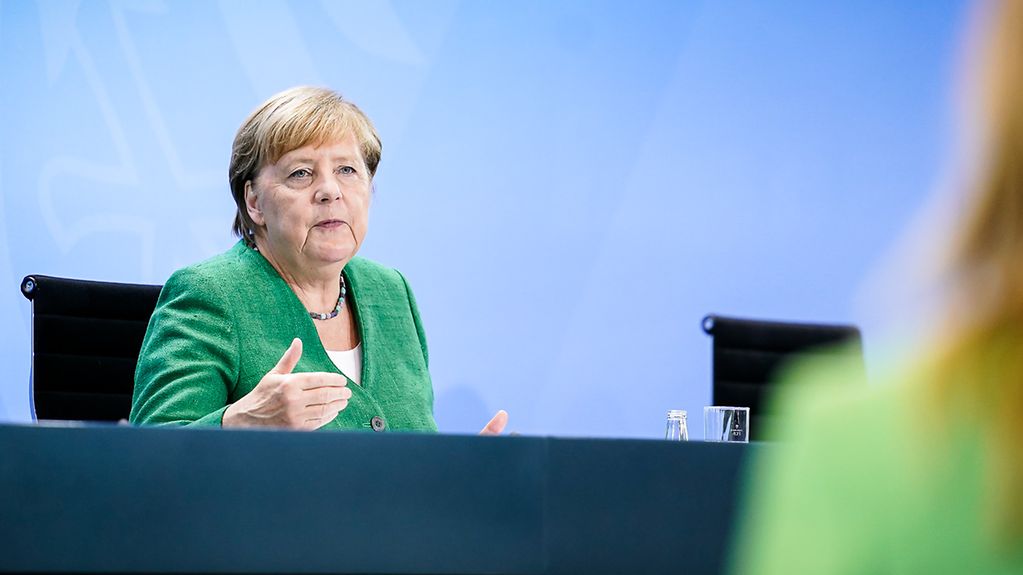Resolutions of federal and state governments
The federal and state governments have always seen the fight against the COVID-19 pandemic as a common challenge, and this understanding has proved its worth, declared Chancellor Angela Merkel following a video conference with the premiers of Germany’s federal states. To underpin achievements to date, additional common measures were agreed, she reported.
4 min reading time

"We want to keep our health service strong during the pandemic, because that will benefit every individual as well as the economy and public life," said Chancellor Angela Merkel.
Photo: Bundesregierung/Kugler
Germany has weathered the COVID-19 pandemic well in recent months, said Chancellor Angela Merkel. In the last few weeks, however, the numbers of new infections have been rising. "Communal accommodation, special events, parties and mobility in conjunction with holidays have been particularly effective in allowing the virus to spread," said Angela Merkel. In view of this increase in the number of cases, we need to make another onslaught. It is our common goal to push down the numbers of new infections as far as possible.
You will find the resolutions of the federal and state governments on the COVID-19 pandemic here.
Distancing, hygiene and masks all still needed
The federal and state governments agree that as the number of new infections rise, there is no justification for easing the restrictions currently in place. Distancing of at least 1.50 m remains essential. In addition, in certain public areas where distancing is not always possible, masks that cover mouth and nose must be worn. Hygiene rules must be respected.
Targeted testing services required
Testing is crucially important to stem the pandemic. The large number of travellers returning from high-risk areas who test positive is proof that accessible, targeted testing services are needed. Mandatory testing will thus remain in place for the time being. The number of cases of infection detected by voluntary testing of travellers returning from areas not classed as high-risk areas, by contrast, was exceptionally low. Because of this, the offer of a free test for travellers arriving from areas not classed as high-risk areas will be discontinued when the staggered school summer holidays come to an end in the last federal states on 15 September 2020.
Priority testing will continue to target suspected COVID-19 cases who are already displaying symptoms and their close contacts. The same applies to preventive testing in vulnerable settings, including pension and care homes, hospitals and facilities for people with disabilities. In view of the fact that more or less regular operations have now resumed in childcare facilities and schools, the federal states have also made provision for testing entire groups where the course of the infection makes this appropriate, especially school teachers and nursery teachers.
Mandatory quarantine for travellers returning from high-risk areas
Travellers returning from high-risk areas will continue to be required to go directly home and self-isolate there for a period of 14 days. As of 1 October, it will be possible to take a test five days after their return at the earliest. If the test is negative, they will no longer be required to self-isolate.
Federal and state governments strongly urge all returning travellers to respect the mandatory self-isolation regulations, and accept the responsibility they have for their fellow citizens. Wherever possible, people should avoid travelling to designated high-risk areas, stressed the Chancellor. Federal and state governments aim to take swift action to modify the current legal situation. The aim is to put in place a nationwide provision, which will ensure that there is no compensation for loss of income resulting from the need to quarantine following non-essential travel, where the travel destination was already a designated high-risk area at the time of travel.
The federal and state governments have agreed on the following measures:
- A minimum fine of 50 euros will be imposed for non-compliance with the requirement to wear a mask in all federal states (except Saxony-Anhalt). The federal and state ministers of transport have also been asked to consider how to put in place the preconditions for introducing a higher ticket price for individuals not wearing a mask on all regional and long-distance public transport, which would have the same effect as a fine.
- The free voluntary testing service for all travellers returning from areas not classed as high-risk areas will be discontinued when the staggered school summer holidays come to an end in the last federal states on 15 September 2020.
- Mandatory testing for travellers returning from high-risk areas will remain in place until effective implementation of the quarantine regulations can be guaranteed. A new self-isolation regulation will be introduced, if possible as of 1 October. It will then be possible for returning travellers to curtail quarantine by taking a test no earlier than five days after their return, provided the test results are negative.
- Large-scale events where contact tracing and hygiene/distancing are impossible will be banned until 31 December 2020 at least. A working group at the level of the state chancelleries is to be set up to explore options for dealing with spectators at nationwide sporting events; the working group is to present a proposal by the end of October.
- The federal government has pledged another 500 million euros to fund reliable online remote schooling, where it is impossible for classroom teaching to take place.
- Individuals with statutory health insurance will this year be accorded five additional days paid leave per parent if they have to stay home to look after their sick children. Single parents will be accorded ten additional days.